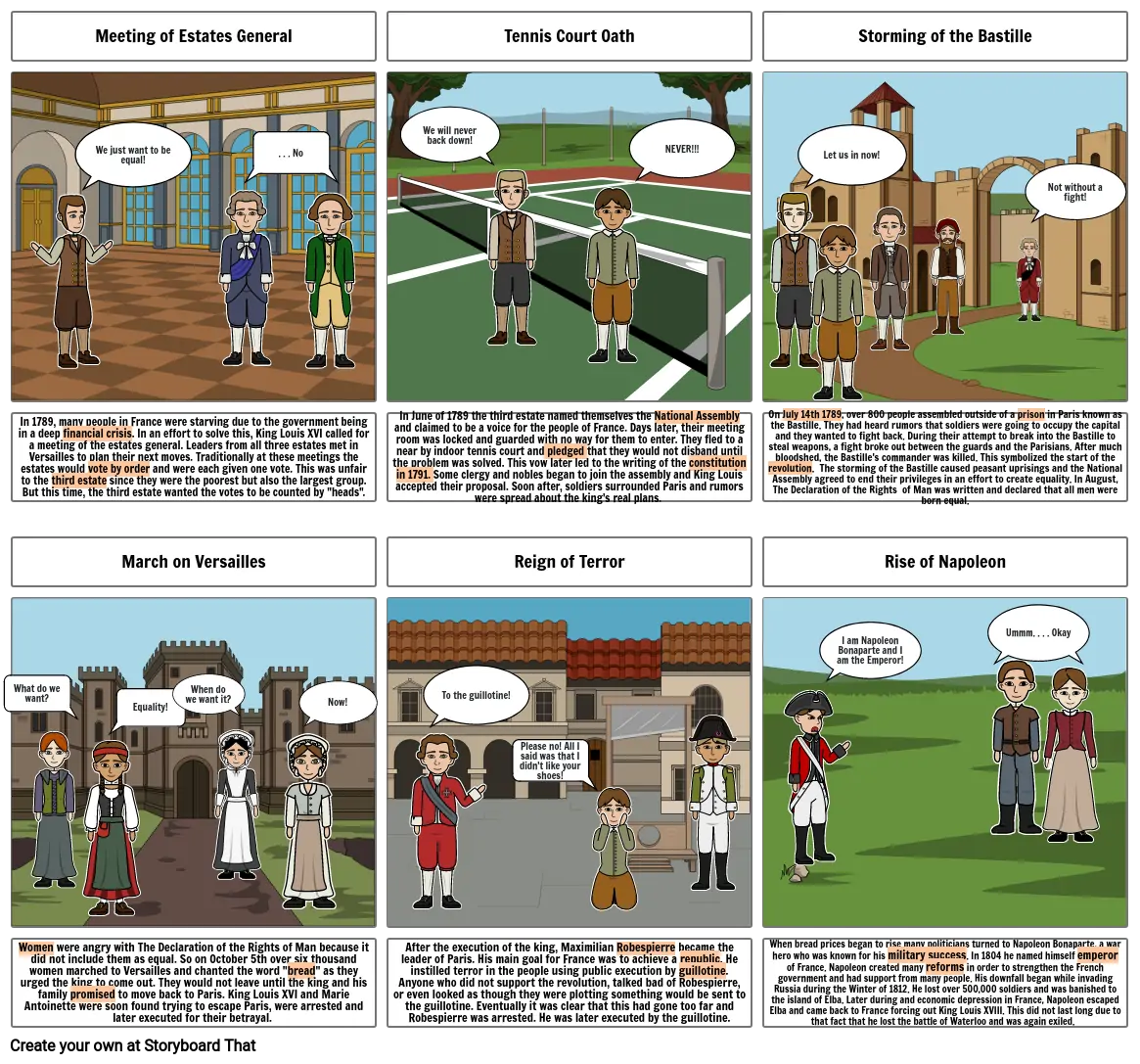French Revolution

स्टोरीबोर्ड पाठ
- Meeting of Estates General
- We just want to be equal!
- . . . No
- Tennis Court Oath
- We will never back down!
- NEVER!!!
- Storming of the Bastille
- Let us in now!
- Not without a fight!
- What do we want?
- In 1789, many people in France were starving due to the government being in a deep financial crisis. In an effort to solve this, King Louis XVI called for a meeting of the estates general. Leaders from all three estates met in Versailles to plan their next moves. Traditionally at these meetings the estates would vote by order and were each given one vote. This was unfair to the third estate since they were the poorest but also the largest group. But this time, the third estate wanted the votes to be counted by "heads".
- March on Versailles
- When do we want it?
- Now!
- In June of 1789 the third estate named themselves the National Assembly and claimed to be a voice for the people of France. Days later, their meeting room was locked and guarded with no way for them to enter. They fled to a near by indoor tennis court and pledged that they would not disband until the problem was solved. This vow later led to the writing of the constitution in 1791. Some clergy and nobles began to join the assembly and King Louis accepted their proposal. Soon after, soldiers surrounded Paris and rumors were spread about the king's real plans.
- Reign of Terror
- To the guillotine!
- On July 14th 1789, over 800 people assembled outside of a prison in Paris known as the Bastille. They had heard rumors that soldiers were going to occupy the capital and they wanted to fight back. During their attempt to break into the Bastille to steal weapons, a fight broke out between the guards and the Parisians. After much bloodshed, the Bastille's commander was killed. This symbolized the start of the revolution. The storming of the Bastille caused peasant uprisings and the National Assembly agreed to end their privileges in an effort to create equality. In August, The Declaration of the Rights of Man was written and declared that all men were born equal.
- Rise of Napoleon
- I am Napoleon Bonaparte and I am the Emperor!
- Ummm. . . . Okay
- Women were angry with The Declaration of the Rights of Man because it did not include them as equal. So on October 5th over six thousand women marched to Versailles and chanted the word "bread" as they urged the king to come out. They would not leave until the king and his family promised to move back to Paris. King Louis XVI and Marie Antoinette were soon found trying to escape Paris, were arrested and later executed for their betrayal.
- Equality!
- After the execution of the king, Maximilian Robespierre became the leader of Paris. His main goal for France was to achieve a republic. He instilled terror in the people using public execution by guillotine. Anyone who did not support the revolution, talked bad of Robespierre, or even looked as though they were plotting something would be sent to the guillotine. Eventually it was clear that this had gone too far and Robespierre was arrested. He was later executed by the guillotine.
- Please no! All I said was that I didn't like your shoes!
- When bread prices began to rise many politicians turned to Napoleon Bonaparte, a war hero who was known for his military success. In 1804 he named himself emperor of France. Napoleon created many reforms in order to strengthen the French government and had support from many people. His downfall began while invading Russia during the Winter of 1812. He lost over 500,000 soldiers and was banished to the island of Elba. Later during and economic depression in France, Napoleon escaped Elba and came back to France forcing out King Louis XVIII. This did not last long due to that fact that he lost the battle of Waterloo and was again exiled.
30 मिलियन से अधिक स्टोरीबोर्ड बनाए गए

